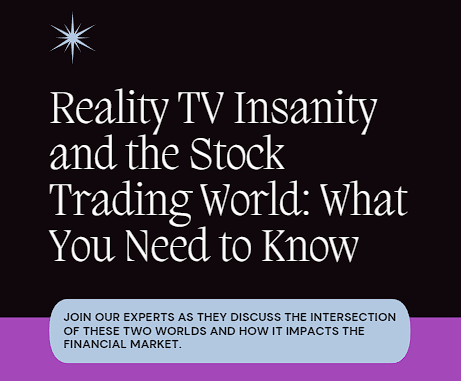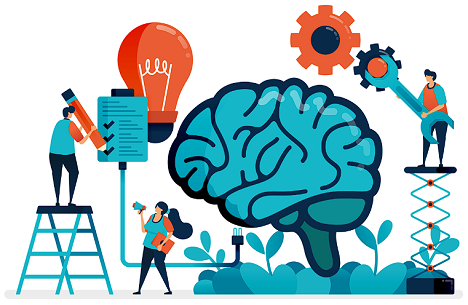
Virtual Insanity: How the Drama of Reality TV Relates to the World of Stock Trading By Trading Ideas
From “Survivor” to “Keeping Up with the Kardashians,” reality TV has transformed over the past two decades from an intriguing curiosity exploring fringe lifestyles into a full-blown viewing addiction. This evolution ranges from hidden camera shows documenting content from the fly-on-the-wall perspective to fully staged productions with confessionals, flooding every conceivable channel and platform. The universal appeal of reality TV lies in the emotional storytelling surrounding unpredictable situations unfolding in real-time, akin to the 24-hour global financial soap opera, the stock market.
The beauty of reality TV is its ability to provide unlimited content, capturing new stories every year from new people through adventure, dating, and families. It evolves as we do, just like the stock market, which will continue to exist as long as we keep investing, and reality TV will continue churning out content as long as we keep watching.
This article aims to highlight the surprising similarities between reality TV and stock trading, exploring the eerie links between pop culture escapism and market engagement—two seemingly unrelated pastimes competing for attention against life’s demands. Reality television and trader terminals revolve around human psychology, sharing far more emotional DNA than meets the eye.
Ability to Appeal to Various Audiences
One of the first similarities lies in the options both provide based on the user’s intention, attention, and lifestyle. For instance, the stock market offers various investment options, catering to long-term or short-term strategies, retail trading, swing trading, day trading, and more to fit people’s specific financial needs.
Reality TV and trading alike have the uncanny capacity to appeal to audiences of all ages, genders, ethnicities, and socioeconomic statuses. With diverse styles and focus areas for shows and financial instruments, viewers and traders self-select outlets that best suit them, whether tuning in for the Great British Bake Off or investing in biotech startup IPOs. The menu ensures everyone can find a flavor custom-catered to innate psychological buttons begging to be pushed.
The Psychological Effects
Chasing Dopamine
One reason people become glued to reality TV is our innate human fascination with dysfunction beyond the relative stability of daily lives. When our regular existence becomes overly consistent and predictable, our brains may subconsciously seek out chaos to stay stimulated.
Reality TV helps feed this craving by allowing us to watch others experience mental tribulations, crises, and emotional reactions, experiencing chaos vicariously behind the fourth wall. Similarly, trading offers an active platform to court danger, providing an outlet for dopamine surges to continue riding the market rollercoaster. Both stimulate dopamine production to sustain engagement.
Generating Addictive Behaviors
Stock trading and reality TV alike can evoke and feed the addictive gene that humans possess, leaving us stuck in a hamster wheel chasing the next surge of dopamine. The more time, energy, and finances you invest, the more challenging it becomes to kick the habit of your dopamine source, whether that be reality shows or trading.
Cognitive Biases and Behaviors
Confirmation Bias and Seeing Patterns
Reality shows and trading both play to inherent human flaws in judgment, such as confirmation bias. Viewers demonize contestants they initially disliked based on first impressions lasting episodes longer, while traders cling stubbornly to money-losing positions, ignoring technical breakdowns. Both overly seek pattern validation rather than altering incorrect assumptions.
Overconfidence and Hindsight Bias
Misplaced certainty in prediction abilities prone to hindsight bias keeps interest piqued through ego. Reality fans feel clever figuring out elimination orders or relationship outcomes prematurely, while traders feign clairvoyance over market directions. Such overconfidence closes their eyes to alternatives, ensuring emotional shocks.
Wealth and Risk Appeal
Lavish prizes on reality shows and long-shot jackpot upsides in trading exploit our innate risk-seeking wiring by catering to lucrative dreams. The appeal of vaulted gain compels irrational risk tolerance.
Herd Mentality
Further driving compulsive habits lie in social validation through sharing reality and trading experiences with groups online or in person. Reddit threads and watch parties fuel engagement through a sense of community and confirmation of shared beliefs. A sense of FOMO lingers around both activities, feeling pressure to keep up with pop culture, from The Bachelor to hyped-up meme stocks. The camaraderie meets innate human social needs while also blinding through groupthink assumptions and normalizing obsessive monitoring of shows or tickers as standard behavior. We compulsively imitate the herd, finding false safety in the mob.
Manufactured Drama and Emotional Reactions
Through cliffhangers, twists, and eliminations, reality show producers prey on our emotions, expertly manufacturing drama to hook viewers by leaving them in suspense for days. Each episode ends baiting anxiously awaited resolutions in the next. The elimination structure turns every episode into a pseudo-gambling loss experience, inciting a stronger obsession to reverse fortune.
The stock market employs similarly manipulative devices to cause mental turmoil, stirring readers through engineered drama. Overnight gaps generate uncertainty and a desire to catch up on potential dangers or opportunities. Binary events like earnings reports, economic data releases, and Federal Reserve meetings carry unknown outcome volatility that hijacks attention. And breaking news headlines introduce external variable complexity, making prediction impossible. Each device stimulates strong emotions through surprise and the peril of ignorance, fueling endless addiction.
Both reality TV and stock trading hinge upon emotionally charged human folly, triumph, and suffering delivered through dramatic uncertainties that all but guarantee perpetual compulsion. Portfolio apps and reality shows provide custom-tailored vehicles catering to these cravings. However, we retain responsibility in choosing how and when to engage rather than ceding all discipline due to sneaky psychological trickery.
Therefore, the next time you lock eyes with salacious reality show trainwrecks or compulsively refresh positions riding high, recall the universal human frailties being exploited behind the scenes solely for corporate profit, not your benefit. Transcend its control through self-awareness rather than remain hapless puppets on strings. We define our reality.
For more insight on how not to fall prey to using the market to fulfill addictive or escapism needs and invest wisely, visit Trade Ideas



